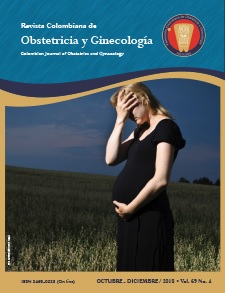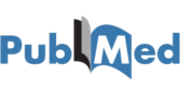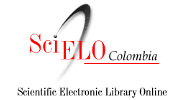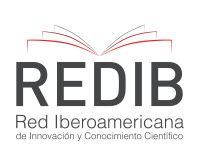Prevalence of thyroid autoimmunity in a population of pregnant women in Santa Marta, Magdalena (Colombia)
DOI:
https://doi.org/10.18597/rcog.3161Keywords:
Thyrotropin, triiodothyronine, thyroxine, thyroid gland, antibodiesAbstract
Objective: To describe the prevalence of thyroid autoimmunity in a hospital-based population of pregnant women, and to explore the frequency in euthyroid and hypothyroid women as well as the association between autoimmunity and the presence of obstetric complications.
Materials and methods: Descriptive cross-sectional study. Accesible population: pregnant women seen at Centros Hospitalarios del Caribe (CEHOCA) in the city of Santa Marta, Magdalena (Colombia), between August 1 and October 31, 2017. Convenience sampling. Sample size: 120 subjects. Thyroid stimulating hormone (TSH), free thyroxine (T4), free triiodothyronine (T3), thyroglobulin (TG) and thyroid peroxidase (TPO) antibodies were determined. Descriptive statistics were used. Prevalence was calculated as the number of women with positive TG or TPO antibodies/ number of women surveyed. Categorization by type of positive antibody and thyroid function (normal or hypothyroidism) was also done.
Results: In women with uncomplicated pregnancies, the frequency of thyroid autoimmunity was 14.29%. Five patients (4.5%) had positive TPO antibodies, 14 patients (12.61%) had positive TG antibodies, while 3 of the women were positive for the two types of antibodies. Antithyroglobulin antibodies were the most frequent. Autoimmunity was found in 13.5% of euthyroid women, and in 18.2% of the women with subclinical hypothyroidism. No association was found between the presence of antibodies and miscarriage, pregnancy-associated hypertension or preterm delivery.
Conclusions: The presence of antithyroid antibodies was found in 1 out of every 7 pregnant women as a sign of autoimmunity. Further observations are required in order to determine frequencies and normality ranges in the local population, as well as the clinical significance of this thyroid autoimmunity.Author Biographies
Carla Lorena Macchia de Sánchez
Médico ginecoobstetra; especialista en Endocrinología Ginecológica y Reproductiva; especialista en Docencia Universitaria. Docente de Planta de la Universidad del Magdalena. Grupo de Investigación en Inmunología y Patología (GIPAT), Universidad del Magdalena, Santa Marta (Colombia). cmacchia@unimagdalena.edu.co
Javier Augusto Sánchez Flórez
Médico ginecoobstetra; especialista en Endocrinología Ginecológica y de la Reproducción, Clínica ESIMED, Santa Marta (Colombia).
References
Su PY, Huang K, Hao JH, Xu YQ, Yan SQ, Li T, et al. Maternal thyroid function in the first twenty weeks of pregnancy and subsequent fetal and infant development: A prospective population-based cohort study in China. J Clin Endocrinol Metab. 2011;96:3234-41. https://doi.org/10.1210/jc.2011-0274
Macchia CL, Sánchez JA. Tirotoxicosis gestacional. En: Builes Barrera CA, Editor. Tratado de tiroides. Asociación Colombiana de Endocrinología, Diabetes y Metabolismo; 2014. p. 194-200.
Balucan FS, Morshed SA, Davies TF. Thyroid autoantibodies in pregnancy: Their role, regulation and clinical relevance. J Thyroid Res. 2013;182472. https://doi.org/10.1155/2013/182472
Bucci I, Giuliani C, Napolitano G. Thyroid-Stimulating hormone receptor antibodies in pregnancy: Clinical relevance. Front Endocrinol. 2017;8:137. https://doi.org/10.3389/fendo.2017.00137
Luo Y. Iodine excess as an environmental risk factor for autoimmune thyroid disease. Int J Mol Sci. 2014;15:12895-912. https://doi.org/10.3390/ijms150712895
Negro R, Greco G, Mangieri T, Pezzarossa A, Dazzi D, Hassan H. The influence of selenium supplementation on postpartum thyroid status in pregnant women with thyroid peroxidase autoantibodies. J Clin Endocrinol Metab. 2007;92:1263-8. https://doi.org/10.1210/jc.2006-1821
Karanikas G, Schuetz M, Kontur S, Duan H, Kommata S, Schoen R, et al. No immunological benefit of selenium in consecutive patients with autoimmune thyroiditis. Thyroid. 2008;18:7-12. https://doi.org/10.1089/thy.2007.0127
Alexander EK, Pearce EN, Brent GA, Brown RS, Chen H, Dosiou C, et al. Guidelines of the American Thyroid Association for the Diagnosis and Management of Thyroid Disease During Pregnancy and the Postpartum. Thyroid. 2017;27:315-89. https://doi.org/10.1089/thy.2016.0457
Fröhlich E, Wahl R. Thyroid autoimmunity: Role of anti-thyroid antibodies in thyroid and extra-thyroidal diseases. Front Immunol. 2017;8:521. https://doi.org/10.3389/fimmu.2017.00521
Mehran L, Tohidi M, Sarvghadi F, Delshad H, Amouzegar A,Soldin OP, et al. Management of thyroid peroxidase antibody euthyroid women in pregnancy: Comparison of the American Thyroid Association and the Endocrine Society Guidelines. J Thyroid Res. 2013; article ID 542692, 6 p. https://doi.org/10.1155/2013/542692
La’ulu SL, Roberts WL. Second-trimester reference intervals for thyroid tests: The role of ethnicity. Clin Chem. 2007;53:1658-64. https://doi.org/10.1373/clinchem.2007.089680
De Vivo A, Mancuso A, Giacobbe A, Moleti M, Maggio Savasta L, De Dominici R, et al. Thyroid function in women found to have early pregnancy loss. Thyroid. 2010;20:633-7. https://doi.org/10.1089/thy.2009.0323
De Carolis C, Greco E, Guarino MD, Perricone C, Dal Lago A, Giacomelli R, et al. Anti-thyroid antibodies and antiphospholipid syndrome: Evidence of reduced fecundity and of poor pregnancy outcome in recurrent spontaneous aborters. Am J Reprod Immunol. 2004;52:263-6. https://doi.org/10.1111/j.1600-0897.2004.00215.x
Liu H, Shan Z, Li C, Mao J, Xie X, Wang W, et al. Maternal subclinical hypothyroidism, thyroid autoimmunity, and the risk of miscarriage: A prospective cohort study. Thyroid. 2014;24:1642-9. https://doi.org/10.1089/thy.2014.0029
Karakosta P, Alegakis D, Georgiou V, Roumeliotaki T, Fthenou E, Vassilaki M, et al. Thyroid dysfunction and autoantibodies in early pregnancy are associated with increased risk of gestational diabetes and adverse birth outcomes. J Clin Endocrinol Metab. 2012;97:4464-72. https://doi.org/10.1210/jc.2012-2540
Kumru P, Erdogdu E, Arisoy R, Demirci O, Ozkoral A, Ardic C, et al. Effect of thyroid dysfunction and autoimmunity on pregnancy outcomes in low risk population. Arch Gynecol Obstet. 2015;291:1047-54. https://doi.org/10.1007/s00404-014-3533-9
Plowden TC, Schisterman EF, Sjaarda LA, Perkins NJ, Silver R, Radin R, et al. Thyroid-stimulating hormone, anti-thyroid antibodies, and pregnancy outcomes. Am J Obstet Gynecol. 2017;217:697.e1-697.e7. https://doi.org/10.1016/j.ajog.2017.09.001
Saki F, Dabbaghmanesh MH, Ghaemi SZ, Forouhari S, Omrani GR, Bakhshayeshkaram M. Thyroid autoimmunity in pregnancy and its influences on maternal and fetal outcome in Iran (a prospective study). Endocr Res. 2015;40:139-45. https://doi.org/10.3109/07435800.2014.966384
Epi-Info. Software disponible en: https://www.cdc.gov/epiinfo/index.html.
The American Thyroid Association Taskforce on Thyroid Disease During Pregnancy and Postpartum, Stagnaro-Green A, Abalovich M Alexander E, Azizi F, Mestman J, Negro R, et al. Guidelines of the American Thyroid Association for the Diagnosis and Management of Thyroid Disease During Pregnancy and Postpartum. Thyroid. 2011;21:1081-1125. https://doi.org/10.1089/thy.2011.0087
Hollowell JG, Staehling NW, Hannon WH, Flanders WD, Gunter EW, Spencer CA, et al. Serum thyrotropin, thyroxine, and thyroid antibodies in the United States population (1988 to 1994): NHANES III. J Clin Endocrinol Metab. 2002;87:489-99.https://doi.org/10.1210/jcem.87.2.8182
Korevaar T, Medici M, Visser TJ, Peeters RP. Thyroid disease in pregnancy: New insights in diagnosis and clinical management. Nat Rev Endocrinol. 2017;13:610-22. https://doi.org/10.1038/nrendo.2017.93
Klein RZ, Haddow JE, Faix JD, Brown RS, Hermos RJ, Pulkkinen A, et al. Prevalence of thyroid deficiency in pregnant women. Clin Endocrinol. 1991;35:41-6. https://doi.org/10.1111/j.1365-2265.1991.tb03494.x
Aguayo A, Grau G, Vela A, Aniel-Quiroga A, Espada M, Martul P, et al. Urinary iodine and thyroid function in a population of healthy pregnant women in the North of Spain. Trace Elem Med Biol. 2013;27:302-6. https://doi.org/10.1016/j.jtemb.2013.07.002
Lazarus J, Brown R, Daumerie C, Hubalewska-Dydejczyk A, Negro R, Vaidya B. European Thyroid Association Guidelines for the Management of Subclinical Hypothyroidism in Pregnancy and in Children. Eur Thyroid J. 2014;3:76-94. https://doi.org/10.1159/000362597
Haddow JE, Cleary-Goldman J, McClain MR, Palomaki GE, Neveux LM, Lambert-Messerlian G, et al. Thyroid Peroxidase and Thyroglobulin Antibodies in Early Pregnancy and Preterm Delivery. Obstet Gynecol. 2010;116:58-62. https://doi.org/10.1097/AOG.0b013e3181e10b30
Korevaar TI, Schalekamp-Timmermans S, de Rijke YB, Visser WE, Visser W, de Muinck Keizer-Schrama SM, et al. Hypothyroxinemia and TPO-antibody positivity are risk factors for premature delivery: The generation R study. J Clin Endocrinol Metab. 2013;98:4382-90. https://doi.org/10.1210/jc.2013-2855
Cleary-Goldman J, Malone FD, Lambert-Messerlian G, Sullivan L, Canick J, Porter TF, et al. Maternal thyroid hypofunction and pregnancy outcome. Obstet Gynecol. 2008;112:85-92. https://doi.org/10.1097/AOG.0b013e3181788dd7
How to Cite
Downloads
Downloads
Published
Issue
Section
| Article metrics | |
|---|---|
| Abstract views | |
| Galley vies | |
| PDF Views | |
| HTML views | |
| Other views | |
















